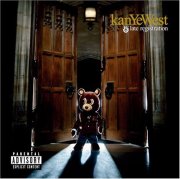The Flexibility of Hip-Hop, a.k.a, Who Says Kanye West Can't Rap?
reviewed by dave heaton

"Make a mistake today for me / go for broke..." - Jonathan Richman
Kanye West's earnest, nervous comments on the Hurricane Katrina telethon (including the instant-quotation "George Bush doesn't care about black people") led LA Weekly's Ernest Hardy to dub him "the hardest man in rap", solely because of the courage involved in speaking from the heart when you're part of a genre where creating and embodying a persona is all part of the game. Hardy doesn't make a connection between that type of courage and Kanye's style as an MC, but there's one waiting to be made. His rhyming style is marked by the same kind of sincerity and willingness to stumble flat on his face. It's in the content, the way he blends ego and self-deprecation, humor and tears. But it's also in the form: in how he forces rhymes through his pronunciation (and purposeful drawl), in how he repeats phrases or sings part of a line to make it work. He gives the impression of trying out whatever it takes to get the lyrics across, of forming his own personal style piece by piece.
'His beats are great, but he can't rap' is becoming a common sentiment about Kanye West, even within the ridiculous storm of hype and praise that's surrounded his second album Late Registration. To give one representative example: In a Pop Matters article on "why hip-hop sucks", Marc Lamont Hill referred to Kanye's "lyrical frailty" and asserted that he's always upstaged by his guest MCs.
The guest MCs on Late Registration do stand out on the album. Lupe Fiasco sounds especially dynamite in his appearance, and "Gone" achieves its status as the album's knock-out closer partly through the force of Cam'ron and Consequence's rhymes. This isn't upstaging, though. It's because West smartly chose guests with a more straight-ahead, head-knocking style that's distinct on his own. Putting different styles of rhyming next to each other makes the album stronger as a whole; the MCs complement each other.
The truth is, if you're looking for a technically perfect, flawless example of the art of rhyming, you not going to find it in Kanye West. If people ever start talking about him as the most skilled MC of all time, suggesting to knock Rakim off his throne, then yes, maybe a revolt would be in order. But to judge an MC solely on technical skill is to take a narrow view of the art form of hip-hop. To make a comparison outside of hip-hop, in rock there's someone like Jonathan Richman, who'll pronounce words incorrectly for the sake of rhyming, or someone like Calvin Johnson, whose singing is more about feeling than perfection. Or in jazz you have Albert Ayler, who was perpetually accused of not really knowing how to play, yet made spellbinding music.
Ayler was an intuitive player, and Kanye West comes off as an intuitive MC. He's making 'mistakes' - rhyming "cigarettes" with "cigarettes", stretching out words to get them to rhyme ("sing-le", "a-part-a-ment"). But he makes mistakes with purpose, stretching the language to his own devices. That's very much in the hip-hop tradition; MCs are masters of language. To master doesn't just mean to 'perfect'. It can mean to control, to twist, to utilize.
West often shifts into speaking or half-singing his lines. He'll purposely repeat a word or line for no obvious reason, or end a line by talk-singing a riff on "Leaving on a Jet Plane". This loose method of rapping fits his inclusive music. It suits his personality on the mic: how heavily he relies on humor, how casually he shifts into tear-jerking mode, how much he shows himself to be full of contradictions, and how social commentary for him seems to be just another part of 'speaking your mind', not about sermonizing or lecturing.
The looseness and variability of his style also suits his musical choices on Late Registration, his desire to add big, bold pop embellishments to his tracks. Assisted to some uncertain extent by producer/musician Jon Brion, West gave the album a sound that's filled with nuance. There's obvious ways that the music was created with a diverse palette, but there's also subtler touches that help give the album rich textures. On "Heard 'Em Say", pay attention not just to the soulful, delicate piano, the answering bassline, and Adam Levine's surprisingly sensitive vocals (he sounds more like NRBQ than Stevie Wonder, but that's not so bad), but to the strange little melody that intercedes now and then in the background, and the vaguely Eastern jazz bit over percussion near the end. On "Touch the Sky", listen not just to the marching band horns and accompanying '70s percussion, but listen for the half-there backing vocals that just sort of disintegrate. "Gold Digger" breaks from the R&B stomp into an odd zig-zaggy version of the melody during the last verse. And so on. Each song is like this, with layers galore. It's a headphones album, through to its last seconds: the bonus track "Late" takes the 'sped-up soul vocals' style of his previous works and updates it in a fresh, luxurious way (my ipod has the song misnamed "We Can Make It Better", a title that seems completely appropriate).
Some mainstream critics praised Late Registration on the grounds that Kanye was transcending hip-hop, the ignorant connotation being that it's a narrow genre worth transcending. Quite to the contrary, Kanye West is showing the diversity within hip-hop, proving that it's not the conservative genre it sometimes seems to be. He demonstrates this by giving Late Registration depth of sound and diversity, but also by rhyming in his own unique, from-the-heart way.
Copyright (c) 2005 erasing clouds |
|